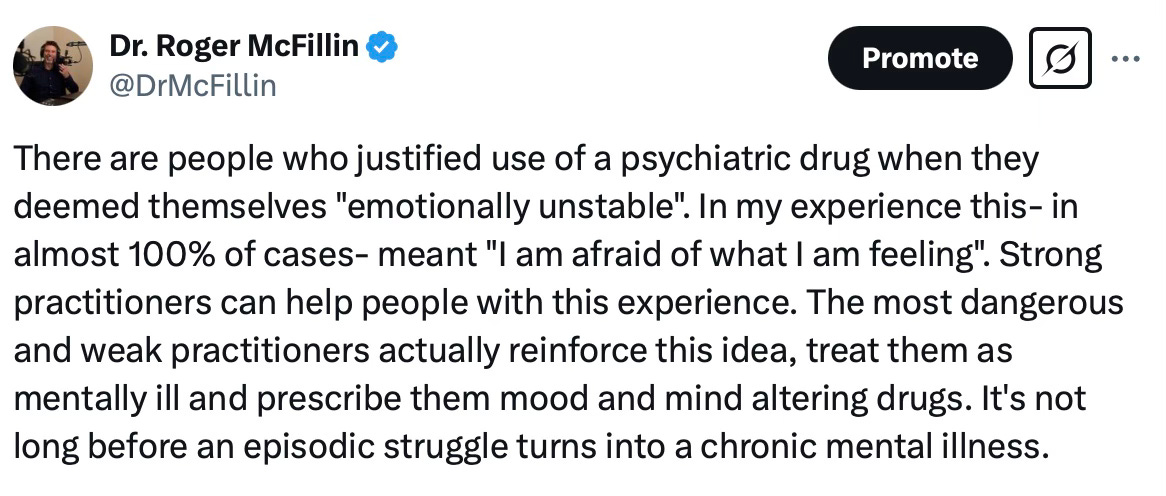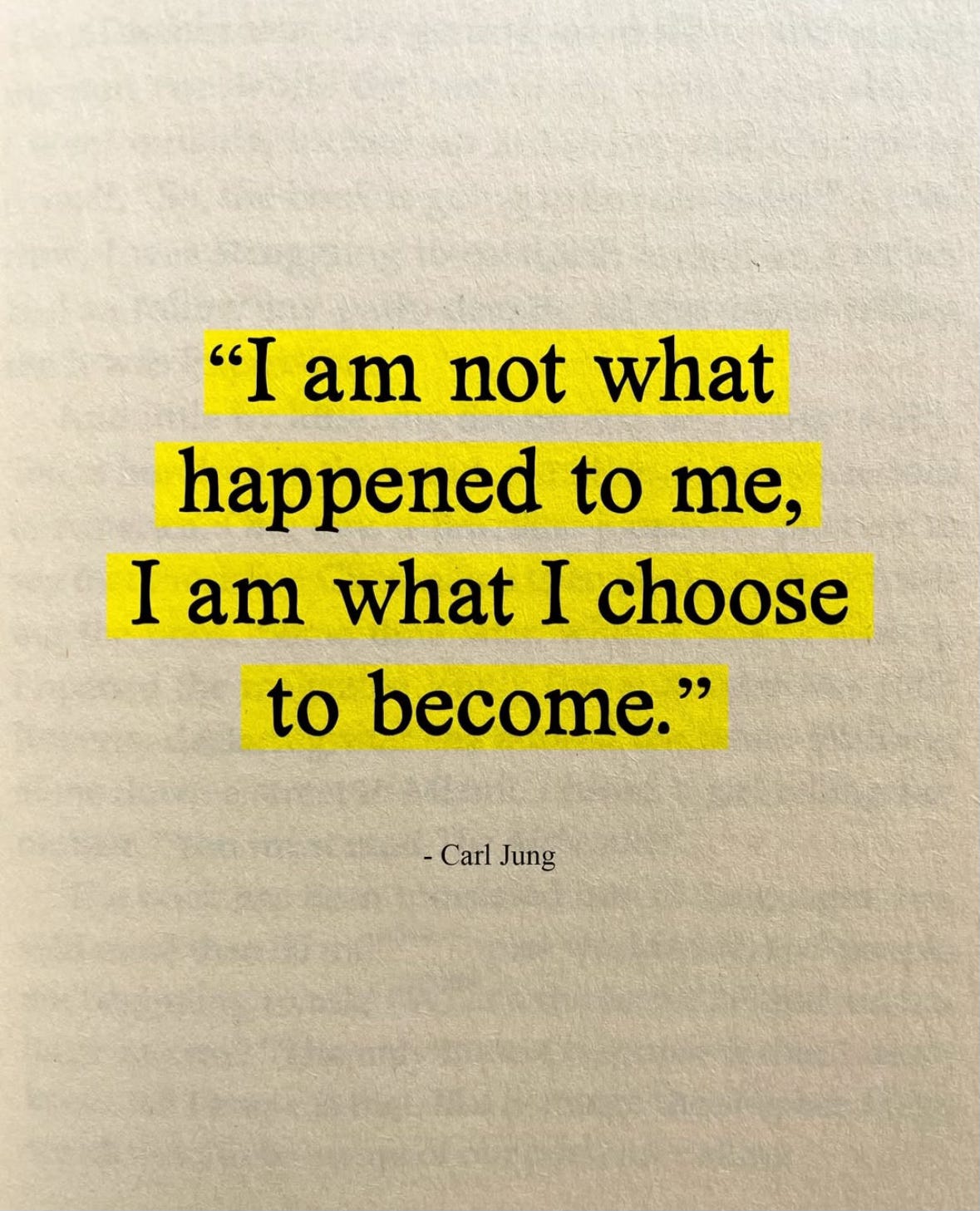"It'll take the edge off."
Four little words that sound so innocent, like offering someone a cup of tea or a comfy blanket.
"It'll take the edge off" — a phrase that's been used to peddle everything from whiskey to cocaine-laced Coca-Cola throughout history. But there's a critical difference. When your grandfather offered you a nip of whiskey for your nerves, he didn't pretend it was medicine. He didn't call your pre-wedding jitters a "generalized anxiety disorder." He didn't suggest your personality needed chemical recalibration. He just acknowledged you were experiencing something difficult and offered a temporary reprieve.
At least the whiskey was honest about what it was selling: temporary altering your experience, not "correcting a chemical imbalance." And when the alcohol wore off, no one suggested you'd need it every day for the rest of your life or that stopping suddenly could create worse problems than you started with. The whiskey didn't come with a pamphlet explaining that the withdrawal effects weren't proof of dependence but rather "evidence of your underlying condition returning."
So what exactly is this terrifying "edge" we're all supposedly teetering on? Is it some precipice of sanity where one strong emotion sends us plummeting into the abyss? Is it that moment when you feel too much anxiety about a job interview, too much sadness about a breakup, or too much worry about your kids?
Remember when people used to say things like, "This job is really stressing me out" and friends would reply with, "That sucks, want to grab a beer and talk about it?" Now it's, "Sounds like you're experiencing Occupational Adjustment Disorder with Anxious Features. Did you talk to your therapist about it? Have you considered medication?"
Who Appointed You Edge-Keeper?
Let's take a moment to consider the sheer audacity. Who exactly decided where this "edge" is? Who determined that your racing thoughts at 3 AM aren't exactly what you need to process that big life change? Who crowned themselves the arbiter of how much emotion is "too much" or what thoughts were “too concerning”?
A new client named “Sarah” came in few months ago, labeled "emotionally unstable" by herself and apparently three previous therapists. Her crime? She cries when she's sad and raises her voice when she's angry. The horror!
"My psychiatrist says I need something to stabilize my moods," she told me, eyes downcast.
Let's conveniently ignore the fact that Sarah has experienced two miscarriages in the past three years. Let's disregard that she grew up in an environment where her intense emotions were routinely punished and mocked by family members. Why bother with context when we can just slap a label on her and prescribe something to smooth out those pesky human reactions?
"And unstable compared to what?" I asked. "A robot? A stone? A particularly chill golden retriever?"
She looked at me, bewildered, smiled and probably wondered in her head if I might be the crazy one. This question had never been posed to her before.
Of course, I understand. For anybody raised in American culture we've been conditioned to view people who express emotions openly as "unstable." It's just so terribly inconvenient for others to deal with someone who actually feels things authentically.
They need to "pull it together."
Oh, but wait—Sarah is bipolar apparently! That explains everything! Time's up, Sarah... get it together, girl. Here's a little something to "take the edge off." It's not your miscarriages or how you learned about your emotions growing up in an invalidating environment—it's a medical condition, and you just require the right care.
Which let’s face it… translates to a 15-minute meeting with a prescription pad jockey and a trip to CVS. And when that doesn't work? Well, of course they need to "adjust the medicine." They'll eventually find the right pharmaceutical cocktail to flatten your humanity into something more manageable. Maybe after the fifth medication combination, or the tenth. It's just a matter of finding the right chemical straitjacket for your particular brand of inconvenient humanity.
It's far easier to reinforce the idea that she's "unstable" and incapable of managing her feelings than to acknowledge that perhaps—just perhaps—her emotions are entirely appropriate responses to profound loss and a lifetime of emotional invalidation. It's simpler to medicate her than to create a world where people are allowed to grieve, to be angry, to express pain without being pathologized for it.
In all her years of treatment, no one had ever questioned whether her emotional responses might actually be—dare I say it—completely reasonable for what she was experiencing. No one asked if the problem might not be her feelings but rather our collective response to them. Did she need some help? Sure she did. But most of that help was developing a new relationship to what she was feeling and of course just the time to grieve the loss and the fear of not being able to conceive a child.
How Our Ancestors Would Mock Us
Imagine explaining our current mental health paradigm to your great-grandparents:
"Yes, Great-Grandma, I'm taking this daily pill because I have anxiety.”
Great-Grandma, who lived through the Great Depression, buried three children, and still managed to keep a garden and make Sunday dinner every week without pharmaceutical assistance, would likely have some choice words for us.
Throughout human history, people have endured plagues, wars, famine, child mortality rates that would horrify us, and the regular Tuesday occurrence of saber-toothed tigers trying to eat their families. They didn't have SSRIs. They didn't have benzodiazepines. They didn't even have therapists telling them their flight-or-fight response was "maladaptive."
Just imagine if our founding fathers had been afraid of their "edge." Picture Thomas Jefferson taking a pause while writing the Declaration of Independence: "You know what, John? I'm feeling some intense emotions about this whole revolution thing. My physician says I should take something to stabilize my moods before making any big decisions. Maybe we should just stay a colony?"
Or imagine Mother Teresa turning away from the devastating poverty, sickness, and aftermath of war she encountered: "This is triggering my anxiety. I need to regulate my nervous system before I can help these people. Perhaps I should focus on self-care instead?"
What about Martin Luther King Jr.? "I had a dream, but my psychiatrist says it might be grandiose thinking. She's prescribed something to help me be more realistic about race relations."
History wasn't made by people who were afraid of their own fear. It wasn't shaped by those who medicated away their righteous anger, their grief, their determination, or their hope. It was forged by those who felt everything—the full catastrophe of being human—and moved forward anyway, transformed by the very experiences our modern world tells us we need protection from.
Yet somehow, humanity survived. Not only survived but created art, music, literature, philosophy, and really comfortable chairs. All while experiencing the full, unfiltered spectrum of human emotion.
But now? Now we're told we need chemical intervention because our boss sent a vaguely disapproving email, and we spent an hour ruminating on it. The fragility!
When "Taking the Edge Off" Takes Everything
Let's get serious for a moment, because this isn't just philosophical musing. This approach has real, sometimes devastating consequences. If you haven’t heard Kim Witczak’s story check out the Radically Genuine Podcast Episode 173.
Global drug safety advocate Kim Witczak's husband Woody wasn't experiencing anything beyond normal human stress when starting a new job. He mentioned sleep troubles to his doctor and walked out with a prescription for Zoloft to—you guessed it—"take the edge off."
Five weeks later, Woody—a man who loved life, carefully tracked his running mileage, couldn't handle a second beer, and was planning anniversary trips—was gone. Lost to a drug induced suicide.
He went from normal job jitters to feeling "outside his body," to pacing, to believing his life was falling apart, all because someone decided his perfectly normal human experience needed pharmaceutical management.
This isn't an isolated tragedy. It's the logical endpoint of a system that pathologizes being human.
The mental health industrial complex has achieved something remarkable: they've convinced us to be afraid of our own internal experiences.
Afraid of intense emotions. Afraid of uncomfortable thoughts. Afraid of memories. Afraid of fear itself.
Meta-fear!
They should patent it.
It's a perfect business model:
Convince people their natural responses are dangerous
Sell them solutions to problems they didn't know they had
When those solutions create new problems, sell solutions to those too
Rinse and repeat until retirement
The greatest trick the mental health industry ever pulled was convincing the world that the devil is inside your own head.
"But I really am emotionally unstable," insists Mark, a new client who's been on five different psychiatric medications for seven years.
"Define 'unstable,'" I challenge him.
After some thought, he offers: "I can't handle what I'm thinking and feeling."
"Says who?" I ask.
The question hangs in the air. Who indeed decided that Mark was incapable of navigating his own internal experience? When did we collectively decide that certain emotions or thoughts are inherently "too much" to bear without chemical intervention?
Outside of the tiny percentage of people experiencing psychosis or presenting an imminent danger to themselves or others, "emotional instability" usually translates to one of these unspoken admissions:
"You're experiencing emotions I don't know how to respond to."
"Your feelings make me uncomfortable."
Or most commonly: "You're having a perfectly normal human reaction to an abnormal situation and it reminds me of thoughts, memories, and feelings I don't want to have."
That last one's the kicker, isn't it? Your authentic emotional response is threatening because it holds up a mirror to the parts of themselves others have worked so hard to numb, suppress, and disown. Your willingness to actually feel your life in real-time is an uncomfortable reminder of everything they've locked away in their own emotional basement. And rather than face that discomfort, it's much easier to diagnose you with a disorder and suggest you join them in the emotionally muted majority.
Reclaiming Our Edges
Here's what the architects of this system don't want you to know: The edge is where growth happens. The edge is where you discover your capacity. The edge is where you become more fully human.
No, scratch that. The edge is where fucking WISDOM lives. It's where transformation occurs. It's where we finally shatter the illusion that we are small, limited beings who can't handle our own humanity.
The edge is where we connect most deeply with others—not through polite small talk and medicated smiles, but through raw, authentic presence. It's where we finally drop the masks and find each other, truly find each other, in our shared vulnerability. It's where compassion is born, where empathy flourishes, where we remember we're not alone in this human experience.
And you know what? There is no fucking edge. We made the entire thing up. This precipice we're supposedly in danger of falling from? It doesn't exist. It's a fiction created by those who profit from our fear, maintained by those who are terrified of their own depths.
Consider any significant growth you've experienced in your life. Did it happen when you were comfortable, complacent, and chemically balanced? Or did it happen when you were challenged, stretched, and forced to develop new capacities? Did your most meaningful connections form when you were hiding your true self, or when you dared to be seen in all your messy glory?
The "edge" isn't a cliff—it's the doorway to everything you're capable of becoming. And I am filled with righteous anger that an entire industry has conspired to convince you this doorway leads to danger rather than transformation.
They've sold you a lie. They've erected a fence around your own potential and called it "mental health." They've pathologized the very experiences that could set you free.
When someone tells you to "take the edge off," what they're really saying is, "I don't believe you're capable of handling this." And there is no more destructive message we can internalize than the belief that we are fundamentally incapable of facing our own lives.
And fuck anyone who tries to define your edge. Fuck the systems that profit from your fear of yourself. Fuck the entire notion that any edge exists except the ones you create in your own mind.
Keep pushing past these imaginary boundaries. The edge isn't real until you decide it is—and when you stop believing in it, what emerges isn't chaos. It's possibility. It's freedom. It's you, fully alive, at last.
RESIST
I try to keep RADICALLY GENUINE as free as I can, but it takes quite a lot of work. If you find some value in my writing and podcast I very much appreciate the paid subscription. It really helps me continue putting time aside for these pieces. Thank you.








I really needed this article today. I agree that a lot of the current psychology b.s. is all about gaslighting us. We've allowed the powers that be to convince us that our hardwired need for real human connection is weakness, when really its humanity's greatest strength. And, now that I think about it, this has surely been done to us intentionally, in a calculated way. Even to the point of normalizing the ostracization of those who are physically dependent on us--including the pre-born members of society, the sick, the disabled and the elderly. The very situations where we should be uplifting each other and standing in the gap are now situations where the ending of a dependent human life is seen as the "cure". And then we wonder why we don't feel safe allowing ourselves to be authentic and vulnerable. Vulnerability and authenticity are our superconnectors, not a disease.
I love your stuff Dr Roger. I am surrounded by 18-25 year olds at work and am fed up of hearing about their “anxiety”. Exams coming up? Anxiety. First date on the weekend? Anxiety. Rental house inspection? Anxiety. No, no and no. Just normal human feelings. Oh my new favourite - what used to be called shyness, and is a naturally occurring trait - “social anxiety” 🙄
The MHIC has a lot to answer for, what a heinous act; to constantly tell our young people there’s “something wrong” with them
PS please, please, please publish a collection of your essays!